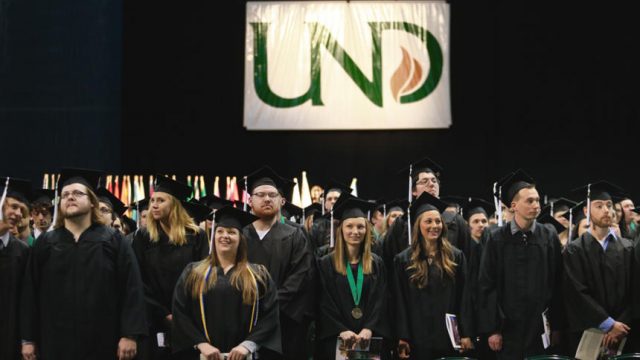University Enrollment Declines Are Good if They’re Happening for the Right Reasons

The UND Class of 2016 looks around as graduates process in for commencement Saturday at the Alerus Center in Grand Forks. photo by Eric Hylden/Grand Forks Herald
Fall enrollment at the University of North Dakota is down slightly this year, but that’s not really a bad thing.
Officials at the university say that why the enrollment number is down the quality of the students they’re admitting is up.
Total enrollment at UND is down 2 percent, this year at 14,648 from last fall’s enrollment of 14,951. Undergraduate enrollment at 11,255 students is down 2.8 percent. A press release attributed the decrease to the university’s focus on quality, the elimination of several programs due to budget reductions and increasing graduation rates paired with larger graduating classes.
Despite the decrease, UND is calling its fall enrollment numbers evidence it has taken on the most “academically prepared and diverse freshman class” yet.
Why is this such a good thing?
Three words: Higher. Education. Bubble.
America subsidizes college enrollment. Heavily. Not only do the states spend big on their public universities, but the federal government has turned student loans into a de facto entitlement. If you want one, you get one, and it doesn’t matter what the odds are for you actually paying it back.
This has been great for business side of higher education. Not only do colleges cramming as many students as possible onto campus get all the revenue that comes with them – from taxpayer-backed tuition payments to money shelled out for books and meals, lodging and fees – but the communities the colleges operate in benefit too.
More students on campus means more business for all the restaurants and bars and stores around the campus. It also means a relatively cheap student labor force, not to mention an inflated fan base for the school athletics teams which seem to have eclipsed academics as the real mission on many campuses.
[mks_pullquote align=”right” width=”300″ size=”24″ bg_color=”#ffffff” txt_color=”#000000″]…public universities aren’t supposed to be a way to harvest money from students. They’re supposed to serve students.[/mks_pullquote]
But for the students and academic outcomes the higher education bubble has been a nightmare. College completion rates have dropped; student loan debt has soared to crisis levels.
What good are we serving by sending kids off to run up debt chasing degrees they probably won’t attain?
The universities have little incentive to care about these things. After all, they get their money up front.
President Dean Bresciani at North Dakota State University is a proponent of this sort of quantity-over-quality approach to enrollment growth. That’s why he proposed a rapid ramp-up of enrollment at NDSU over the objections of lawmakers and ND University System Chancellor Mark Hagerott, one of the factors that has Bresciani’s job in jeopardy with the State Board of Higher Education.
Packing more kids onto the NDSU campus would be great for business interests Bresciani seems to serve. I wonder how many of those businesses pour money into the NDSU Development Foundation which, in turn, pays for perks for Bresciani like his country club membership and luxury travel upgrades?
A question worth exploring. But I digress.
Public universities aren’t supposed to be a way to harvest money from students. They’re supposed to serve students. And sometimes, as tough as it may be to hear, students are best served by having their enrollment applications declined.
Because we aren’t serving students well by encouraging them to run up debt pursuing degrees they probably won’t obtain. Keep in mind, at UND and NDSU the four-year graduation rate for four-year degrees is around 25 percent, and the six-year rate (for a four year degree!) is around 53 percent.
At UND they seem to be embracing this quality-over-quantity philosophy. Maybe that philosophy could be brought to NDSU as well, though I’m afraid it will require a leader other than Mr. Bresciani to accomplish it.




